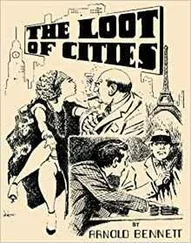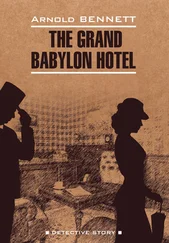He led Mrs. Arb down towards the nearest point of Farringdon Road, though this was not the shortest way home. The tramcars stopped at the corner. Every one of them would deposit him at his own door. Paradise for one penny! No, twopence; because he would have to pay for Mrs. Arb! He had thought to defeat his passion at this corner. He was mistaken. He could not. He had, after all his experience, misjudged the power of his passion. He was as helpless as the creatures who were beginning to gather at the iron-barred doors of the public-houses, soon to open for a couple of too short hours; and also he had the secret ecstasy which they had. He could scarcely talk now, and each tram that passed him in his slow and endless march gave him a spasm of mingled bitterness and triumph. His fear now was lest his grand passion should on this occasion be overcome by bodily weakness. He did not desire it to be overcome. He desired it to conquer even if it should kill him.
"I'm afraid I've walked you too far," said Mrs. Arb.
"Why?"
"I thought you were limping a bit."
"Oh no! I always limp a bit. Accident. Long time ago." And he smartened his gait.
They reached Riceyman Steps in silence. He had done it! His passion had forced him to do it! His passion had won! There were two Mr. Earlforward's: one splendidly uplifted, the other ready to faint from pain and fatigue. The friends disappeared, each into the solitude of his own establishment. In the afternoon Mr. Earlforward heard a sharp knock on his front-door; it was repeated before he could get downstairs; and when he opened the door he opened it to nobody; but Mrs. Arb was just entering her shop. He called out, and she returned.
"I was a bit anxious about your leg," she said, so brightly and kindly, "so I thought I'd step across and inquire."
"Quite all right again, now, thank you." (An exaggeration.)
How delightful of her! How feminine! He could hardly believe it! He was tremendously flattered. She could not after all slip through his fingers, whatever happened! They chatted for a few moments, and then each disappeared a second time into the recondite, inviolate solitude of his own establishment.
Chapter
14
One morning in November, at a little past eight o'clock, Mrs. Arb, watching from behind the door of her yet. unopened shop, saw Mr. Earlforward help Elsie to carry out the empty bookstand and set it down in front of the window, and then, with overcoat, muffler and umbrella, depart from Riceyman Steps on business. Mrs. Arb immediately unlocked her door, went out just as she was—hatless, coatless, gloveless, wearing a white apron—locked her door, and walked across to Mr. Earlforward's. Elsie had already begun to fill the book-stand with books which overnight had been conveniently piled near the entrance of the shop.
"Good morning, Elsie. Dull morning, isn't it? Is master up yet?" said Mrs. Arb vivaciously, rubbing her hands in the chilly, murky dawn, and brightening the dawn.
"Oh, 'm! He's gone out. I don't expect him back till eleven. It's one of his buying mornings, ye see."
Oh, dear, dear!" Mrs. Arb exclaimed, with cheerful resignation. "And I've only got ten minutes. Well, I haven't really got that. Shop ought to be open now. But I thought I'd let 'em wait a bit this morning."
She glanced anxiously at her own establishment to see whether any customer had come down the steps from the square. But, in truth, as she had now sold the business, and the premises, and was to give possession in a few weeks, she was not genuinely concerned about the possible loss of profit on an ounce or two ounces of tea. She wandered with apparent aimlessness into Mr. Earlforward's shop.
"Did you want to see him particular, 'm ?"
"I won't say so particular as all that. So you look after the shop when Mr. Earlforward is out, Elsie?"
"It's like this, 'm. All the books is marked inside, and some outside. If anybody comes in that looks respectable, I ask 'em to look round for themselves, and if they take a book they pay me, and I ask 'em to write down the name of it on a bit of paper." She pointed to some small memorandum sheets prepared from old unassorted envelopes which had been cut open and laid flat, with pencil close by. "If it's some regular customer like, that must see Mr. Earlforward himself, I ask 'em to write their names down. And if I don't like the look of anybody, I tell 'em I don't know anything, and out they go."
"What a good arrangement!" said Mrs. Arb approvingly. "But if you have to attend to the shop, how can you do the cleaning and so on Elsie's ingenuous, kind face showed distress; her dark-blue eyes softened in solicitude.
"Ah, 'm! There you've got me. I can't. I can only clean the shop these mornings, and not much of that neither, because I must keep my hands dry for customers."
Mrs. Arb, vaguely smiling to herself, trotted to and fro in the gloomy shop, which had the air of a crypt, except that in these days crypts are usually lighted by electricity, and the shop was lighted by nature alone on this dark morning. She peered, bending forward, into the dark spaces between the bays, and descried the heaps of books on the floor. The dirt and the immense disorder almost frightened her. She had not examined the inside of the shop before—had, indeed, previously entered it only once, when she was in no condition to observe. Mr. Earlforward had never seized an occasion to invite her within.
"This will want some putting straight," she said, " if ever it is put straight."
"And well you may say it, 'm," Elsie replied compassionately. "He's always trying to get straight, 'specially lately, 'm. We did get one room straight upstairs, but it meant letting all the others go. Between you and mc, he'll never get straight. But he has hopes, and it's no use saying anything to him."
"I suppose you can do this room, too, on his buying mornings," said Mrs. Arb, peeping into Mr. Earlforward's private back-room from which the shop and the shop-door could be kept under observation.
"Oh, 'm! He wouldn't let me. He won't have anything touched in that room."
"Then who does it?"
"He does it himself, 'm—when it is done."
"Does he!" murmured Mrs. Arb in a peculiar tone.
The bookshelves went up to the ceiling on every side. The floor was thickly strewn with books, the table also. Chairs also. The blind lay crumpled on the book-covered window-sill. The window was obscured by dirt. The ceiling was a blackish-grey. A heavy deposit of black dust covered all things. The dreadful den expressed intolerably to Mrs. Arb the pathos of the existence of a man who is determined to look after himself. It convicted a whole sex of being feckless, foolish, helpless, infantile, absurd. Mrs. Arb and Elsie exchanged glances. Elsie blushed.
"Yes. I'm that ashamed of it, 'm!" said Elsie. "But you know what they are!"
Mrs. Arb gave two short nods. She moved her hand as if to plumb the layer of dust with one feminine finger, but refrained; she dared not.
"And do you do his cooking, too?" she asked.
"Well, 'm. He gets his own breakfast, and he makes his own bed—it's always done before I come of a morning—and he cleans his own boots. I begin his dinner, but, seeing as I go at twelve, he finishes it. He gets his own tea. I must say he isn't what you call a big eater."
"Seems to me it's all very cleverly organized."
"Oh, it is, 'm! There's not many gentlemen could manage as he does. But it's a dreadful pity. Makes me fair cry sometimes. And him so clean and neat himself, too."
"Yes," said Mrs. Arb, agreeing that the contrast between the master and his home was miraculous, awful, and tragic.
"I suppose I'd better not go upstairs as he isn't here, Elsie?"
The two women exchanged more glances. Elsie perfectly comprehended the case of Mrs. Arb, and sympathized with her. Mrs. Arb was being courted. Mrs. Arb had come to no decision. Mrs. Arb desired as much information as possible before coming to a decision. Women had the right to look after themselves against no matter what man. Women were women, and men were men. The Arb-Earlforward affair was crucial for both parties.
Читать дальше












